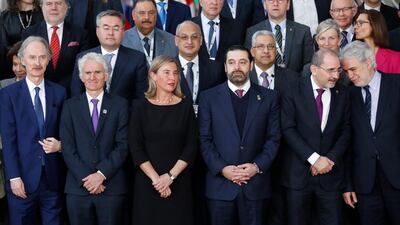The main donor event for Syria and the region closed on Thursday with more than 85 countries and organisations pledging almost $7 billion.
But that amount was still short of the $9bn sought by the UN to deliver lifesaving support to the nation.
The EU commissioner for humanitarian aid, Chrystos Stylianides, said the pledges “confirm our determination to stand by those in need”.
“I would like to thank donor representatives for delivering on their promises,” Mr Stylianides said, as he closed the third Brussels conference for Supporting the Future of Syria and the Region.
“Now we must translate these pledges into action on the ground.”
Halfway through the day, UN undersecretary general for humanitarian affairs Mark Lowcock said it looked as if at least $6.5bn, or Dh23.87bn, and possibly close to $7 billion had been pledged.
“That is a very significant result and if that is where we end up at the end of the day we will be pleased,” Mr Lowcock said.
Minister of State Zaki Nusseibeh announced the UAE would pledge $65 million (Dh238.76 million) to alleviate the suffering of the Syrian people.
Last year, the international community pledged €3.5 billion (Dh14.5bn) to support humanitarian aid, stabilisation and development in Syria and the region. It also pledged €2.9bn for 2019 and 2020.
International financial institutions and donors announced almost €17.2bn in loans until 2020.
Fifteen international humanitarian agencies said they were disappointed over the lack of commitment on resettlement programmes.
“The international community needs to share responsibility by increasing resettlement pledges and translating those pledges into actual pledges,” said the organisations, which include Save the Children and the Norwegian Refugee Council.
The number of resettlements has dropped by two thirds since 2017.
A Lebanese delegation of more than 100 national and international NGOs said it welcomed the level of pledges but a political solution was needed in Syria that allowed refugees to feel safe to return home.
Throughout the day, UN representatives made compelling appeals for aid, stressing the hardships faced by Syrians inside the country and in the region.
In a video appeal to those attending, UN Secretary General Antonio Guterres urged countries to “renew your financial, humanitarian and political commitments to the Syrian people, and to the countries and communities hosting refugees”.
Mr Guterres said that “only a political solution based on Security Council Resolution 2254 can bring sustainable peace to Syria".
The resolution, ratified in 2015, expressed support for a Syrian-led political process aided by the UN that would establish “credible, inclusive and non-sectarian governance” and set a schedule and process for drafting a new constitution.
UN High Commissioner for Refugees Filippo Grandi said “needs are becoming more, not less severe” for Syrians inside and outside the country, and called for more investments to ease the strain on host communities in Lebanon, Turkey, Jordan, Egypt and Iraq.
The Brussels III conference was organised with the aim of keeping “Syria and the Syrian people on top of the international agenda at a time in which the international community seems to care a bit less,” EU High Representative Federica Mogherini said.
The bloc has so far supported the Syrian people with more than €70bn since the start of the crisis in 2011.

